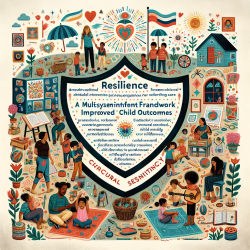Introduction
The COVID-19 pandemic has posed unprecedented challenges to mental health worldwide. The study "Patterns of Psychological Responses among the Public during the Early Phase of COVID-19: A Cross-Regional Analysis" offers valuable insights into how psychological flexibility can serve as a critical mediator in mitigating the adverse mental impacts of the pandemic. As practitioners dedicated to fostering positive outcomes for children, understanding and applying these findings can enhance our ability to support the mental health of young learners and their families.
The Power of Psychological Flexibility
Psychological flexibility, the capacity to remain open to experiences and committed to values-driven actions, emerged as a significant factor in promoting mental health across diverse regions. The study's findings underscore the importance of cultivating this trait to enhance resilience against stressors such as the pandemic.
For speech-language pathologists and educators, integrating psychological flexibility into practice can involve:
- Encouraging mindfulness and acceptance in children, helping them navigate emotions and experiences.
- Promoting value-driven goals, fostering a sense of purpose and motivation in learning.
- Modeling flexible thinking and problem-solving approaches, enhancing adaptability in challenging situations.
Implications for Practice
Implementing strategies that promote psychological flexibility can have profound impacts on the mental well-being of children and their families. By fostering an environment that supports openness and adaptability, practitioners can help mitigate the psychological impacts of stressors like COVID-19.
Additionally, the study highlights the role of prosociality—behaviors intended to benefit others—as a mediator in certain regions. Encouraging prosocial behaviors in children can promote empathy, social connectedness, and emotional well-being, further supporting their mental health.
Encouraging Further Research
The findings from this study provide a foundation for further exploration into the role of psychological flexibility and prosociality in mental health. Practitioners are encouraged to engage in ongoing research and professional development to deepen their understanding of these concepts and their application in educational settings.
By staying informed and adapting evidence-based practices, we can continue to provide effective support to children and families, fostering resilience and positive outcomes in the face of adversity.
Conclusion
As we navigate the ongoing challenges posed by the COVID-19 pandemic, embracing psychological flexibility and prosociality offers a pathway to resilience and mental well-being. By integrating these concepts into our practice, we can empower children to thrive in uncertain times.
To read the original research paper, please follow this link: Patterns of Psychological Responses among the Public during the Early Phase of COVID-19: A Cross-Regional Analysis.










